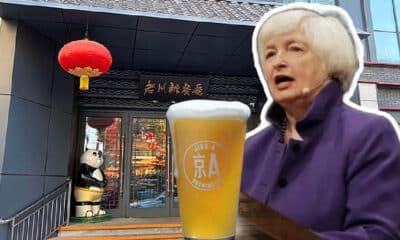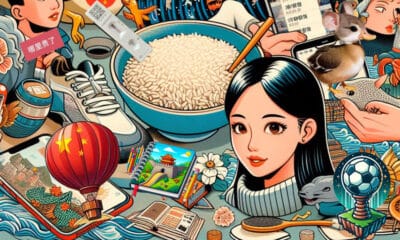China Food & Drinks
Chinese Restaurants Closed For Use of Opium Poppies in Food
According to Chinese state officials, 35 restaurants have been closed down for using opium poppies in their food.
Published
9 years agoon
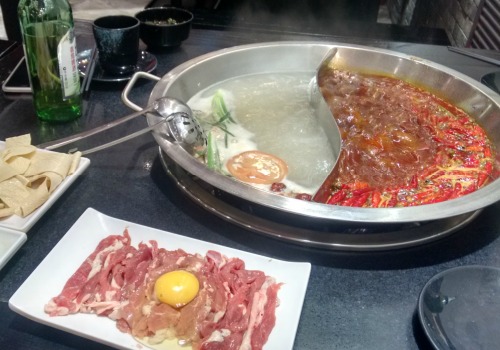
According to Chinese state officials, 35 restaurants have been closed down for using opium poppies in their food.
China’s Xinhua News reported on Thursday that the China Food and Drug Administration (CFDA) has found 35 restaurants illegally using opium poppy powder as seasoning in their food. Their food contained traces of, amongst others, opium base, morphine and codeine.
The CFDA discovered the violations while carrying out food standards inspections for the use of illegal food additives. According to The Guardian, there is also a popular Beijing hotpot chain amongst the restaurants.
Opium poppy is the species of plant from which opium is derived. The ‘poppy capsules’ (or poppy seed heads) (罂粟壳) that have been found to be used in Chinese restaurants, are mixed with oil and powder. After being cooked, like is done with the soup for hotpot, it can yield opium. Long-term consumption can seriously damage one’s digestive and central nervous system.
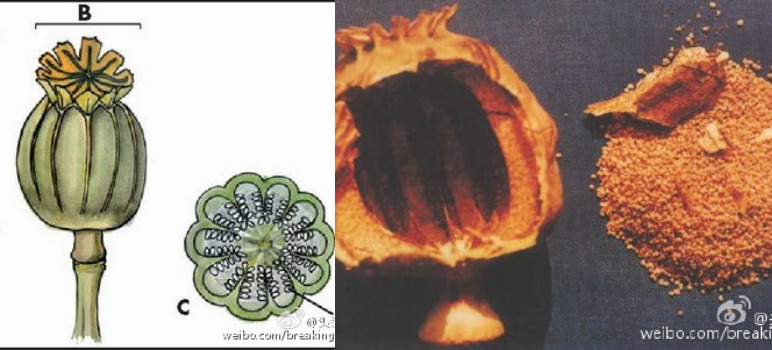
Although it has since long been known that hotpot restaurants and diners across the country use illegal additives to get customers hooked on their food, the poppy powder case only came to light in 2014. A certain Mr. Wang had hotpot dinner in a local Shaanxi restaurant, and was tested positive for opium later in the evening during a routine drugs inspection by local police, People’s Daily writes.
Although the use of poppy is legal in medical treatments and scientific research, it is an illegal drug in China. Nevertheless, poppy powder with relatively high opiate content, made from capsules and shells, is readily available in markets around China for around $60 per kilo. When the additives are mixed with chilli oil and powders, detection becomes harder without laboratory equipment, the Guardian writes.
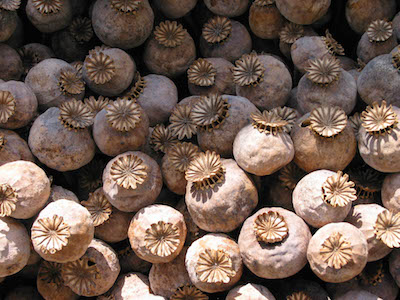
Weibo netizens do not seem to take the news too seriously: “The poppy capsule is a traditional Chinese medicine, how could it harm to add it to our hotpot? Have you ever seen someone go unconscious while eating hotpot because of poppy powder?”
“Such a mysterious thing, poppy seed capsules,” another netizen says: “It contains morphine..cocaine…why would we put it in our hotpot? We need to export it!”
– By Manya Koetse
Follow @WhatsOnWeibo
Featured image by author in a popular Beijing hotpot chain.
©2016 Whatsonweibo. All rights reserved. Do not reproduce our content without permission – you can contact us at info@whatsonweibo.com.
Manya is the founder and editor-in-chief of What's on Weibo, offering independent analysis of social trends, online media, and digital culture in China for over a decade. Subscribe to gain access to content, including the Weibo Watch newsletter, which provides deeper insights into the China trends that matter. More about Manya at manyakoetse.com or follow on X.

You may like
China Food & Drinks
The ‘China-chic Girl’ Image and the Realities of China’s Competitive Food Delivery Market
How did the trendy and cute “China Chic” cartoon image come to symbolize questionable takeout food in China?
Published
4 weeks agoon
January 25, 2025By
Ruixin Zhang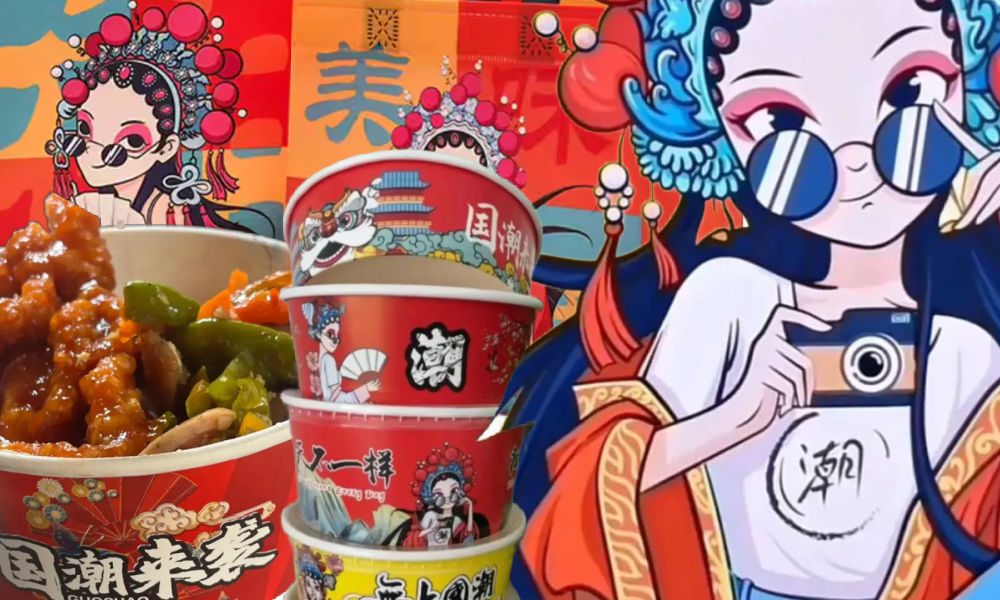
FROM THE WEIBO WATCH PREMIUM NEWSLETTER
“What should we order for dinner?” is a daily dilemma for millions of Chinese consumers in one of the world’s largest food delivery markets. With numerous platforms, cuisines, menus, and discount options, choosing the right takeout—one that is tasty, affordable, and safe—can feel like a daunting task.
But these days, many Chinese people follow a simple rule to identify bad takeout: if your delivery comes in packaging featuring a playful young woman wearing sunglasses, a traditional Peking opera headdress, and holding a fan—often with the bold trendy character “潮” (cháo, meaning “trend”)—it’s likely to be an unhealthy meal with potential food safety risks.

As one netizen joked, “I was so excited for my takeout, only to see this lady on the package and feel my heart sink.” Why does this seemingly cheerful cartoon figure evoke so much distrust and dislike from so many?
China-chic Girl
In 2020, digital illustrator @YUMI created the “China-chic Girl” image in response to a client’s request for a design that embodied the “China-chic” (国潮, guócháo) aesthetic.
China-chic, or guócháo—literally meaning “national tide”—refers to the rise of Chinese domestic (fashion) brands that often incorporate culturally Chinese elements into contemporary designs. This trend emerged as a reflection of growing nationalist sentiment in China, offering a Chinese counterpart to popular Japanese or Korean-inspired styles. From fashion and makeup to milk tea, ‘China-chic’ quickly became a defining element of China’s consumer culture (read more here).
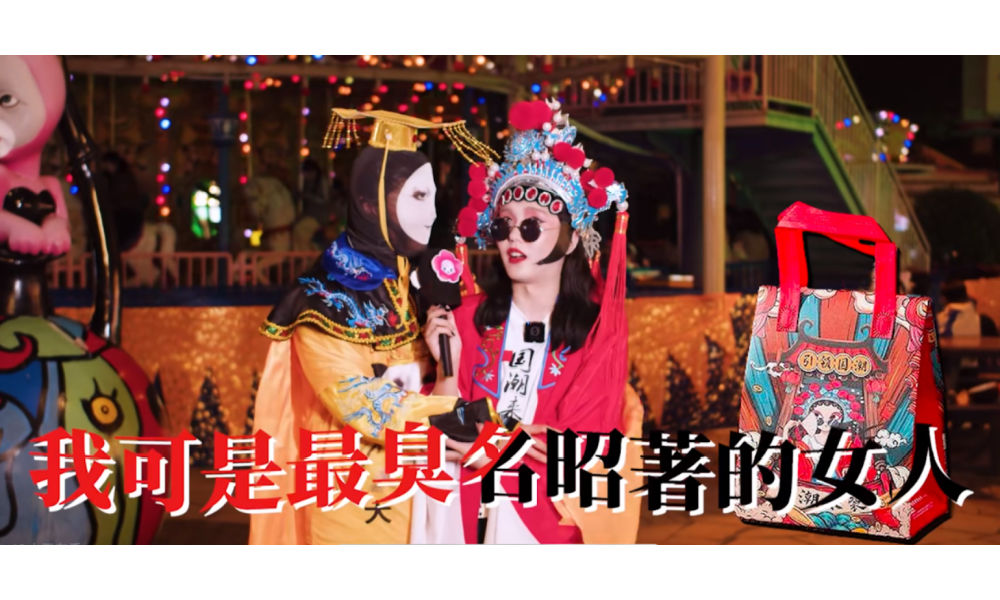
Vlogger @花小雕 dressed up as the “China-chic” girl for Halloween.
However, when YUMI’s client failed to pay, she chose to release the design for free public use. YUMI’s creation—a blend of traditional Peking opera elements and modern sunglasses—struck a chord with its simple yet iconic charm. Its accessibility made it even more appealing, and the China-chic Girl soon became the go-to design for restaurants looking for affordable, visually striking takeout packaging.
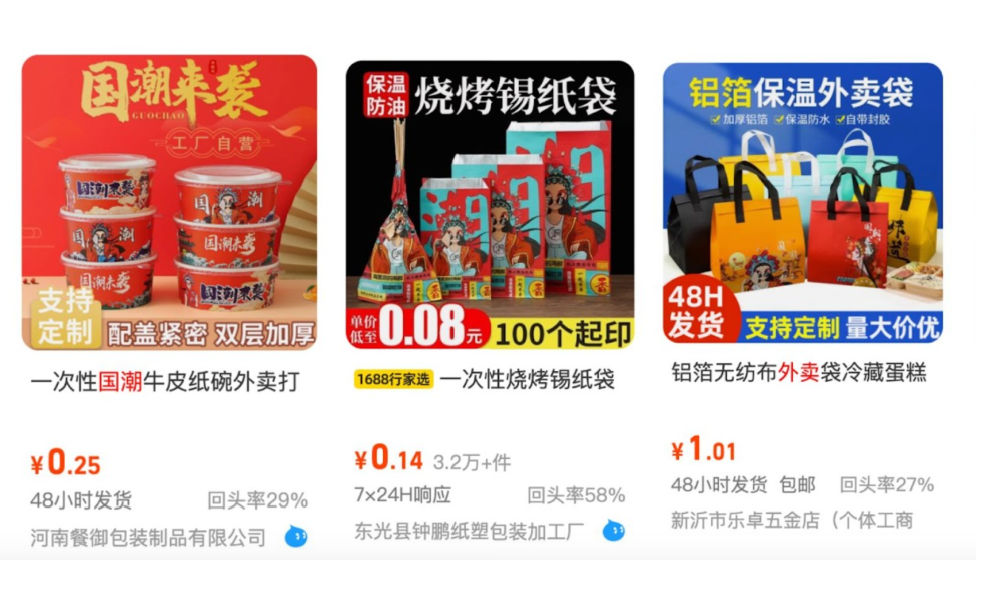
On China’s wholesale website 1688, you can find a wide range of cheap takeout packaging with the “China-chic girl” on it.
The China-chic Girl was all the rage, until last fall.
Starting in September, some delivery drivers began exposing filthy kitchen conditions on social media, warning customers to avoid takeout from certain restaurants after witnessing food safety issues and kitchen hazards while waiting for orders.
Over time, people began noticing a pattern: the dirtiest kitchens were often small, non-chain establishments with no physical storefronts—just cramped spaces dedicated solely to takeout. Operating on tight budgets, these businesses often chose the inexpensive China-chic girl packaging to cut costs, unintentionally associating the China-chic girl with unsanitary and unsafe food practices.
As a result, netizens—especially young people who heavily rely on food delivery—started compiling guides to help each other avoid sketchy takeout options. The warning signs? Restaurants offering “cashback for good reviews” or those that lack a proper storefront, often listing only food items instead of a real restaurant name. These red flags point to private kitchens, poorly managed spaces, or even unregulated food safety practices. Additionally, many of these ‘China-chic takeouts’ thrive within the “group-buying” model on food delivery platforms.
No Such Thing As a Free Lunch
The “group-buying” model, popularized by platforms like Temu and its Chinese counterpart Pinduoduo (拼多多), allows users to invite friends, family, or colleagues to purchase a product together at a discounted price.
This strategy has since evolved into a pseudo-group-buying model, where even without inviting others, the group-buying discount is still applied. These discounts are carefully calculated by platforms to ensure that, even at reduced prices, profits can still be made due to the high sales volume.
Both Meituan (美团) and Eleme (饿了么)—the two largest food delivery platforms in China—have adopted this approach by introducing budget-friendly services such as Pinhaofan (拼好饭) and Pintuan (拼团) to target lower-tier markets.
For example, a typical 30 RMB ($4.15) takeout might cost only half that price through these services, with additional platform coupons and new user discounts making it almost irresistibly affordable.
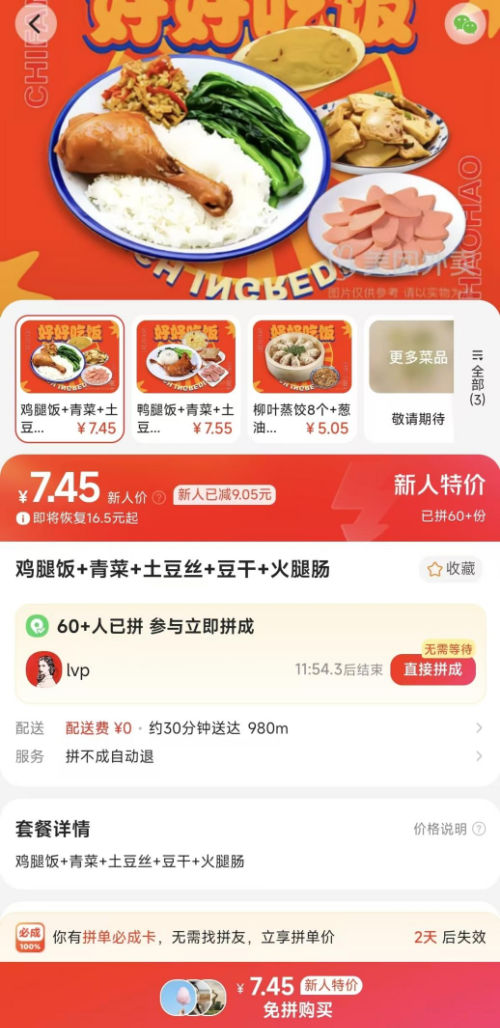
A meal for 7.45 yuan ($1), but how fresh and safe is it?
But, of course, there’s no such thing as a free lunch. As many users have discovered, getting a full meal for under 10 RMB ($1.40) often comes at the expense of quality. These Pinhaofan takeouts commonly feature pre-made dishes with indistinguishable ingredients, flimsy utensils that can’t even scoop rice, a box of suspicious juice full of artificial coloring, low-grade packaging, and, of course, that cheap, once-iconic China-chic design.
A Meme Culture of “Bad Food”
Despite widespread awareness of these issues, the cheap Pinhaofan orders remain incredibly popular. According to Meituan’s second-quarter earnings report, the Pinhaofan service is booming, with order volumes reaching a record high of over 8 million orders per day. Why do people continue to order these potentially unsafe meals despite knowing the risks?
“Low price” has been the keyword for Meituan and the Chinese food delivery market for a long time. In the face of a sluggish economy and rising youth unemployment, online discussions are dominated by concerns over “consumption downgrades” (消费降级), “middle-class poverty” (中产返贫), “youth unemployment” (青年失业率), and “deflation” (通缩).
More and more people are turning to affordable takeout as a quick fix for their everyday struggles, even if the quality leaves much to be desired.
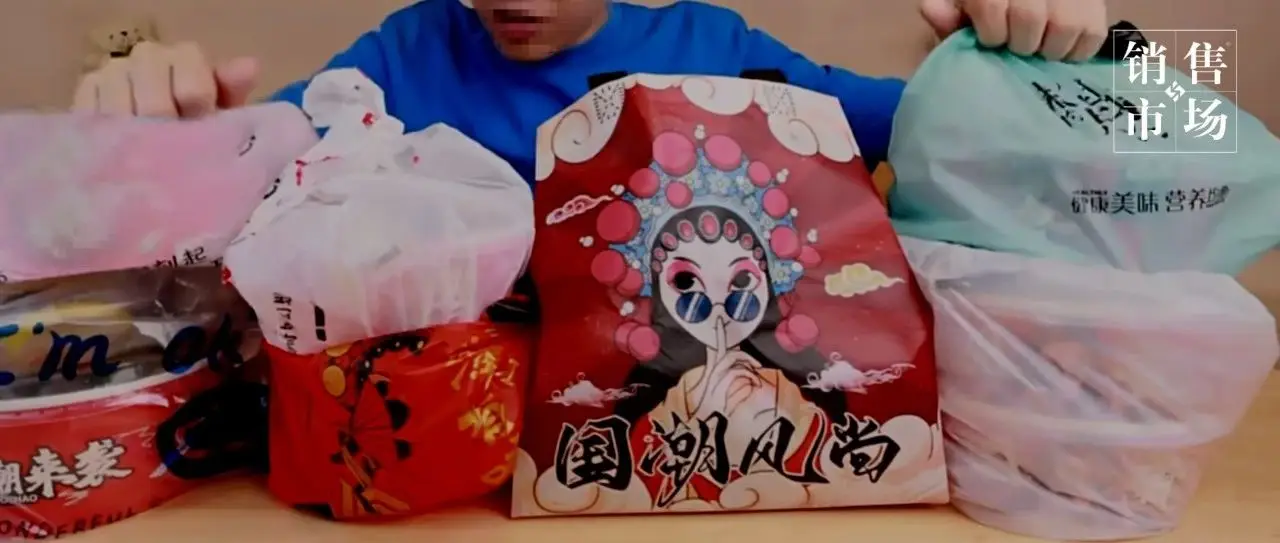
China Chic Girl Takeout
“I’m not stupid; I don’t expect a gourmet feast for 10 yuan ($1.4),” is a common attitude. As wallets run dry and work hours grow longer, health often becomes an afterthought.
This harsh reality, combined with the “lie-flat” mentality embraced by many young people, has turned ‘China-chic takeout’ and ‘Pinhaofan’ into online memes.
These meals have become symbols of resignation and self-deprecating humor among Chinese youth. When someone dares to express dissent or outrage about unchangeable realities—whether personal struggles or broader national policies—they’re often met with tongue-in-cheek pessimistic remarks like, “Have a couple of Pinhaofan meals and you’ll calm down” (“吃两顿拼好饭就老实了”).
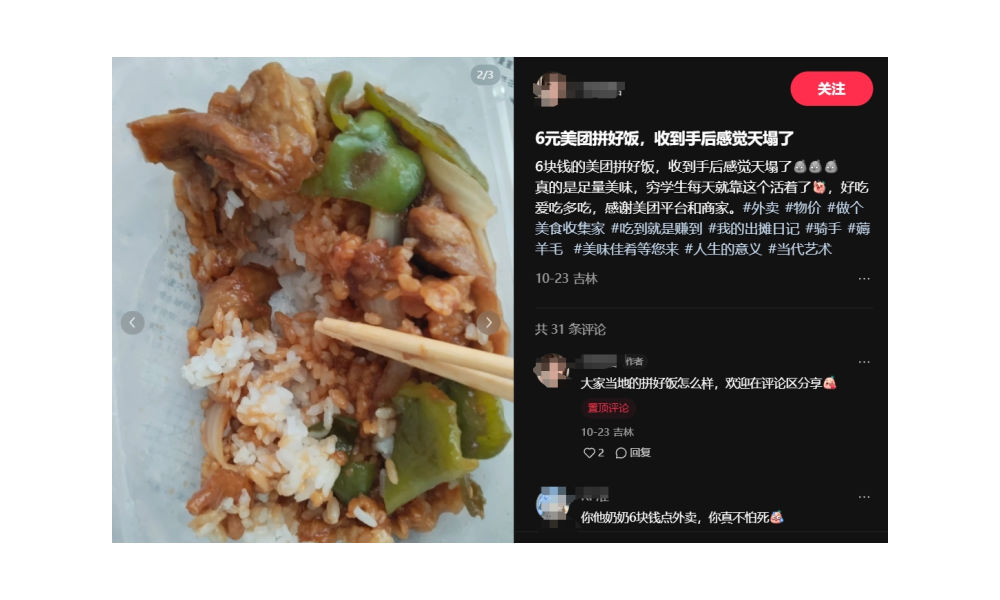
Comparing take-out food: how bad is it actually? There’s a meme culture around Pinhaofan takeout food.
This phenomenon reflects a psychological defense mechanism. For young people who know they cannot change their circumstances, who find themselves at the bottom of society enduring immense hardship—even exploitation—they no longer confront failure directly or refer to themselves using the once-common “diaosi” (屌丝, loser).
Instead, they say things like, “Eating Pinhaofan every day makes me feel like I’ve won in life.” Perhaps it’s a bittersweet acceptance, but it’s not defeat.
No One Benefits—Except the Platforms
While memes can be entertaining, the real-world impact of Pinhaofan is far from positive for most involved—except for the platform giants. According to a report by Zhiwei Editorial Department (@知危编辑部), the Pinhaofan service significantly cuts into restaurant owners’ profit margins. Unlike regular takeout orders, where businesses pay a commission based on the final price, Pinhaofan offers a fixed, much lower payout per order, determined by the platform’s pricing categories. This often leaves restaurants with a meager profit margin of just 2-3 RMB ($0.3-$0.4) per order.
To stay afloat, restaurants are forced to cut corners—replacing fresh meats with frozen ones, opting for cheaper ingredients, and, of course, using the cheapest packaging, often taking the “China Chic” route.
So why do restaurants stick with this model?
The answer is simple: survival. On food delivery platforms, restaurant rankings are usually heavily influenced by factors like operational experience and longevity, giving older, established businesses a visibility advantage. This creates a cycle where newcomers struggle to compete.
The Pinhaofan model changes this dynamic by ranking individual dishes rather than entire restaurants. A single hit dish can boost a restaurant’s overall visibility and sales. In China’s highly competitive food delivery market, platform exposure is everything. Platforms often encourage struggling new restaurants to join Pinhaofan, positioning it as an opportunity to gain visibility. Faced with relentless competition and aggressive price wars, restaurants feel they have no choice but to participate, even if it means compromising on quality and profit.
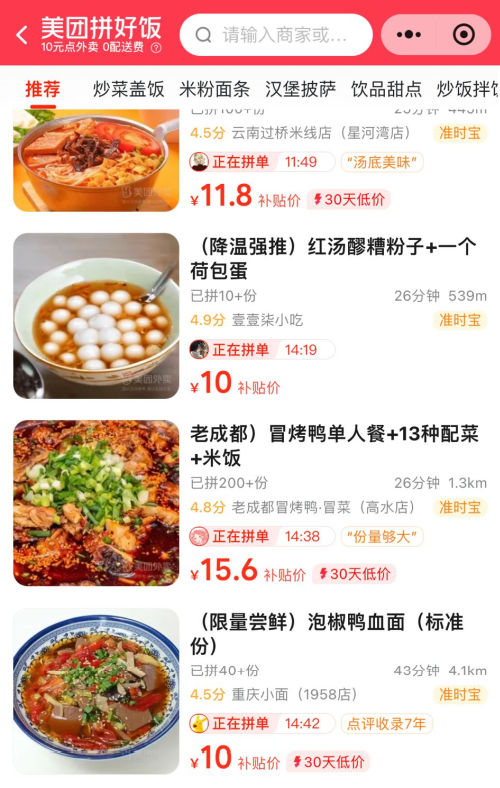
Pinhaofan model: rankings ar based per dish, instead of per restaurant.
For delivery drivers, Pinhaofan presents its own set of challenges. To accommodate its group-order nature, Meituan introduced a “Changpao” (畅跑, or “smooth running”) mode for couriers. Under this system, couriers are assigned multiple Pinhaofan orders—often bundled with regular orders from the same restaurant along the same route—in a single trip, enabling them to deliver 2-3 times the usual number of orders in one go. The promise of “more work, more pay” draws couriers in, but the reality is far less rosy.
As explained by one Chinese blogger (@黑夜之晴天滚雪球), couriers’ per-order income under Changpao is nearly 50% lower than in regular modes. Even with a higher delivery volume, their overall earnings see little improvement. Worse still, regular (non-Pinhaofan) orders included in these bundled deliveries are also paid at the lower Changpao rate.
Couriers have vented their frustrations on social media, labeling Pinhaofan and Changpao as “exploitative.” One courier shared that a single Pinhaofan order earned them just 2.5 RMB ($0.35), and when group discounts were factored in, their earnings dropped to less than 1 RMB ($0.14) per order.
While couriers direct their grievances toward the system, customers are increasingly dissatisfied with the service. Complaints about couriers refusing to deliver Pinhaofan orders upstairs are growing. In some cases, couriers have reportedly even tampered with food to express their anger in a system where resistance feels futile.
For full-time couriers, the situation is even more grueling. Many work seven-day weeks, with at least two mandatory days spent on Changpao mode, leaving them with little choice but to comply with the system’s demands.

Shiba inu having China Chic takeout food. Meme video.
The “China chic girl” has gone from being a playful symbol of pride in domestic products to representing the problems of China’s fast and cheap takeout industry. What once celebrated affordability now highlights cost-cutting, poor quality, and exploitation.
It’s unclear if the memes and discussions around Pinhaofan will eventually bring real change to the situation at hand. But one thing is certain: the once-cute packaging now serves as a reminder of the sacrifices made by customers, restaurants, and delivery drivers in a system that eventually benefits only the platforms.
By Ruixin Zhang
Independently covering digital China for over a decade. Like what we do? Support us and get the story behind the hashtag by subscribing:
edited for clarity by Manya Koetse
Spotted a mistake or want to add something? Please let us know in comments below or email us. First-time commenters, please be patient – we will have to manually approve your comment before it appears.
©2024 Whatsonweibo. All rights reserved. Do not reproduce our content without permission – you can contact us at info@whatsonweibo.com.
China Brands, Marketing & Consumers
A Brew of Controversy: Lu Xun and LELECHA’s ‘Smoky’ Oolong Tea
Chinese tea brand LELECHA faced backlash for using the iconic literary figure Lu Xun to promote their “Smoky Oolong” milk tea, sparking controversy over the exploitation of his legacy.
Published
10 months agoon
May 3, 2024
It seemed like such a good idea. For this year’s World Book Day, Chinese tea brand LELECHA (乐乐茶) put a spotlight on Lu Xun (鲁迅, 1881-1936), one of the most celebrated Chinese authors the 20th century and turned him into the the ‘brand ambassador’ of their special new “Smoky Oolong” (烟腔乌龙) milk tea.
LELECHA is a Chinese chain specializing in new-style tea beverages, including bubble tea and fruit tea. It debuted in Shanghai in 2016, and since then, it has expanded rapidly, opening dozens of new stores not only in Shanghai but also in other major cities across China.
Starting on April 23, not only did the LELECHA ‘Smoky Oolong” paper cups feature Lu Xun’s portrait, but also other promotional materials by LELECHA, such as menus and paper bags, accompanied by the slogan: “Old Smoky Oolong, New Youth” (“老烟腔,新青年”). The marketing campaign was a joint collaboration between LELECHA and publishing house Yilin Press.

Lu Xun featured on LELECHA products, image via Netease.
The slogan “Old Smoky Oolong, New Youth” is a play on the Chinese magazine ‘New Youth’ or ‘La Jeunesse’ (新青年), the influential literary magazine in which Lu’s famous short story, “Diary of a Madman,” was published in 1918.
The design of the tea featuring Lu Xun’s image, its colors, and painting style also pay homage to the era in which Lu Xun rose to prominence.
Lu Xun (pen name of Zhou Shuren) was a leading figure within China’s May Fourth Movement. The May Fourth Movement (1915-24) is also referred to as the Chinese Enlightenment or the Chinese Renaissance. It was the cultural revolution brought about by the political demonstrations on the fourth of May 1919 when citizens and students in Beijing paraded the streets to protest decisions made at the post-World War I Versailles Conference and called for the destruction of traditional culture[1].
In this historical context, Lu Xun emerged as a significant cultural figure, renowned for his critical and enlightened perspectives on Chinese society.
To this day, Lu Xun remains a highly respected figure. In the post-Mao era, some critics felt that Lu Xun was actually revered a bit too much, and called for efforts to ‘demystify’ him. In 1979, for example, writer Mao Dun called for a halt to the movement to turn Lu Xun into “a god-like figure”[2].
Perhaps LELECHA’s marketing team figured they could not go wrong by creating a milk tea product around China’s beloved Lu Xun. But for various reasons, the marketing campaign backfired, landing LELECHA in hot water. The topic went trending on Chinese social media, where many criticized the tea company.
Commodification of ‘Marxist’ Lu Xun
The first issue with LELECHA’s Lu Xun campaign is a legal one. It seems the tea chain used Lu Xun’s portrait without permission. Zhou Lingfei, Lu Xun’s great-grandson and president of the Lu Xun Cultural Foundation, quickly demanded an end to the unauthorized use of Lu Xun’s image on tea cups and other merchandise. He even hired a law firm to take legal action against the campaign.
Others noted that the image of Lu Xun that was used by LELECHA resembled a famous painting of Lu Xun by Yang Zhiguang (杨之光), potentially also infringing on Yang’s copyright.
But there are more reasons why people online are upset about the Lu Xun x LELECHA marketing campaign. One is how the use of the word “smoky” is seen as disrespectful towards Lu Xun. Lu Xun was known for his heavy smoking, which ultimately contributed to his early death.
It’s also ironic that Lu Xun, widely seen as a Marxist, is being used as a ‘brand ambassador’ for a commercial tea brand. This exploits Lu Xun’s image for profit, turning his legacy into a commodity with the ‘smoky oolong’ tea and related merchandise.
“Such blatant commercialization of Lu Xun, is there no bottom limit anymore?”, one Weibo user wrote. Another person commented: “If Lu Xun were still alive and knew he had become a tool for capitalists to make money, he’d probably scold you in an article. ”
On April 29, LELECHA finally issued an apology to Lu Xun’s relatives and the Lu Xun Cultural Foundation for neglecting the legal aspects of their marketing campaign. They claimed it was meant to promote reading among China’s youth. All Lu Xun materials have now been removed from LELECHA’s stores.

Statement by LELECHA.
On Chinese social media, where the hot tea became a hot potato, opinions on the issue are divided. While many netizens think it is unacceptable to infringe on Lu Xun’s portrait rights like that, there are others who appreciate the merchandise.
The LELECHA controversy is similar to another issue that went trending in late 2023, when the well-known Chinese tea chain HeyTea (喜茶) collaborated with the Jingdezhen Ceramics Museum to release a special ‘Buddha’s Happiness’ (佛喜) latte tea series adorned with Buddha images on the cups, along with other merchandise such as stickers and magnets. The series featured three customized “Buddha’s Happiness” cups modeled on the “Speechless Bodhisattva” (无语菩萨), which soon became popular among netizens.

The HeyTea Buddha latte series, including merchandise, was pulled from shelves just three days after its launch.
However, the ‘Buddha’s Happiness’ success came to an abrupt halt when the Ethnic and Religious Affairs Bureau of Shenzhen intervened, citing regulations that prohibit commercial promotion of religion. HeyTea wasted no time challenging the objections made by the Bureau and promptly removed the tea series and all related merchandise from its stores, just three days after its initial launch.
Following the Happy Buddha and Lu Xun milk tea controversies, Chinese tea brands are bound to be more careful in the future when it comes to their collaborative marketing campaigns and whether or not they’re crossing any boundaries.
Some people couldn’t care less if they don’t launch another campaign at all. One Weibo user wrote: “Every day there’s a new collaboration here, another one there, but I’d just prefer a simple cup of tea.”
By Manya Koetse
[1]Schoppa, Keith. 2000. The Columbia Guide to Modern Chinese History. New York: Columbia UP, 159.
[2]Zhong, Xueping. 2010. “Who Is Afraid Of Lu Xun? The Politics Of ‘Debates About Lu Xun’ (鲁迅论争lu Xun Lun Zheng) And The Question Of His Legacy In Post-Revolution China.” In Culture and Social Transformations in Reform Era China, 257–284, 262.
Independently reporting China trends for over a decade. Like what we do? Support us and get the story behind the hashtag by subscribing:
Spotted a mistake or want to add something? Please let us know in comments below or email us. First-time commenters, please be patient – we will have to manually approve your comment before it appears.
©2024 Whatsonweibo. All rights reserved. Do not reproduce our content without permission – you can contact us at info@whatsonweibo.com.
What’s on Weibo Chapters
Subscribe

From Weibo to RedNote: The Ultimate Short Guide to China’s Top 10 Social Media Platforms

Collective Grief Over “Big S”

Tuning Into the Year of the Snake

The ‘China-chic Girl’ Image and the Realities of China’s Competitive Food Delivery Market

From “Public Megaphone” to “National Watercooler”: Casper Wichmann on Weibo’s Role in Digital China

Our Picks: Top 10 Chinese Buzzwords and Phrases of 2024 Explained

“Dear Li Hua”: The TikTok/Xiaohongshu Honeymoon Explained

Why Chinese Hit Movie “Her Story” is ‘Good Stuff’: Stirring Controversy and Celebrating Female Perspectives

Chiung Yao’s Suicide Farewell Letter: An English Translation

12-Year-Old Girl from Shandong Gets Infected with HPV: Viral Case Exposes Failures in Protecting Minors

Breaking the Taboo: China’s Sanitary Pad Controversy Sparks Demand for Change

Weibo Watch: Christmas in China Is Everywhere and Nowhere

Weibo Watch: A New Chapter

Weibo Watch: China’s Online Feminism Is Everywhere

Story of Chinese Female MA Graduate Going Missing for 13 Years Sparks Online Storm
Get in touch
Would you like to become a contributor, or do you have any tips or suggestions? Get in touch here!
Popular Reads
-

 China Insight10 months ago
China Insight10 months agoThe Tragic Story of “Fat Cat”: How a Chinese Gamer’s Suicide Went Viral
-

 China Music11 months ago
China Music11 months agoThe Chinese Viral TikTok Song Explained (No, It’s Not About Samsung)
-

 China Insight12 months ago
China Insight12 months agoThe ‘Two Sessions’ Suggestions: Six Proposals Raising Online Discussions
-

 China Digital9 months ago
China Digital9 months agoChina’s 2024 Gaokao Triggers Online Discussions on AI



